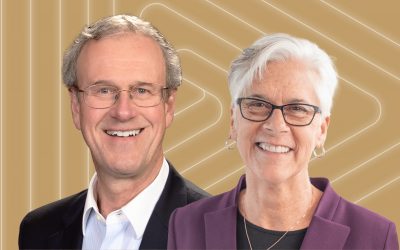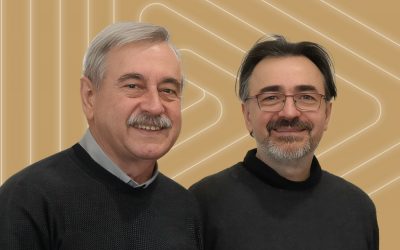As a young boy in Beirut, Fadi Daou always knew his cause was to serve the people. This calling, although unclear at that time, was magnified by having borne witness to “the civil war in Lebanon and the many other conflicts in the Middle East.”
“I studied political philosophy and religious studies. The aim was always to try to find solutions to identity-based conflicts—religious conflicts, sectarian conflicts, and wars that have been so destructive for the Middle East and beyond,” he says.
Since then, Fadi has had an illustrious career in academia as a published scholar and in civil society. He is the co-founder of Adyan Foundation, a non-profit civil society organization that promotes diversity, peacebuilding, and fosters positive interactions between religions and the public sphere.
Fadi’s inclination towards public service is rooted in experiencing firsthand the systemic issues that continue to plague those in the peripheries, especially people in positions of power. He adds, “I believe that the problems of our world cannot be fixed without having the right leaders, in the right positions, with the right values that inform and motivate their decisions.”
Going beyond just leadership
The Franco-Lebanese changemaker, who now resides in Geneva, Switzerland, believes that leaders have the capacity to influence people’s lives in good or bad ways.
He makes use of the present environmental crisis and climate change to illustrate his point: “It was not the knowledge that was lacking from the beginning that our global behavior is negatively affecting the environment and we are heading to a catastrophe because of global warming and climate change. We have known it for more than 70 years now, if you look at the academic research—the knowledge was available.”
He continues, “What was missing is the courage of leaders to make the right decision and say: ‘If we have to choose between profit for my company or winning elections, or to save the future of the planet, I will take the decision of saving the future of the planet, even if I will have some less profit or less popularity on the political level.’”
Unfortunately, according to Fadi, these kinds of decisions were not taken in this direction due to the lack of ethical leadership saying, “They were leaders but not ethical leaders. This is why I believe that to make our world better, more sustainable, more just, more fair, and more inclusive, we need to move from this ‘leadership’ narrative to an ‘ethical leadership’ narrative, because it’s not only about giving power to people and helping them to lead others. It’s also about [making] sure that those people who have the power to lead others will make decisions that will move in the right direction.”
The ‘gray area’ of ethical leadership
Fadi sits as the Executive Director of Globethics to advocate for a society that understands and exemplifies ethical leadership. In a nutshell, he describes the work of the organization as capacitating emerging and established leaders with the “ethical capacity to make the best decision or the right decisions for the common good of the people.”
“For many people, ethics is a very abstract subject. But for us [at Globethics], we think that what motivates—consciously or unconsciously—any decision people take in their life is their ethical background. Any decision we take in our life is informed by what our conscience is made of, and those are values. Ethics is this capacity of making the right decisions in difficult circumstances,” he says.
Fadi, however, is cognizant of the fact that the concept of ethics is not a simple binary where we can “look at life in a dualistic way, like it’s black and white, and [where]it’s very easy to choose good or bad.”
He adds, “Most of the life situations are complex and in a gray area where it’s not totally black and it’s not totally white, and you need to take action. This is why we need to have a strong operational ethical capability to help us make the right decision and to do the right action in complex situations.”
Re-envisioning the future
Growing up, Fadi always wanted to work for a better world without knowing where or how to start. He shares, “I was always motivated by my faith and my values and the education that I received from my family that to be […] a happier person, you need to be a cause of happiness in others life […] and so this is my motto somehow; my drive, happiness, joy, […], and the meaning of my life.”
Today, the world is bombarded by a plethora of issues from wars and genocides, to environmental challenges, and the risks brought about by emerging technology. This is further compounded by the lack of ethical leadership in society.
Yet despite all this, Fadi remains hopeful for the future. He credits this capacity to envision a better tomorrow to the youth who inspire him.
“What makes me capable of envisioning a better future is working with younger generations. I see the future as positive and better because I’m meeting and working with young people who are extremely generous,” he says.
“[They] remind me of my young age where I was ready to even give my blood and my life for the cause I got engaged for […] I see how generous [they are] in their engagement to make this a better world. I expect a brighter future because we have emerging ethical leaders among the younger generation.”
From 2-4 September at Maison de la Paix in Geneva, Switzerland, Globethics will be leading the Global Ethics Forum (GEF), a global, multisectoral, and inclusive platform fostering dialogue and networking among institutions, policymakers, and experts from various sectors. The 2024 edition marks the relaunching of GEF centered on “Ethical Leadership for a Re-envisioned Future.” Registration for online or onsite attendance is open and for free.
Lawrence Chong, Consulus Group CEO, will be participating in the event in two interventions and will also present his new book Creative Change.
Now available in collector’s and hardcover versions.
About Consulus
Consulus is a global creative change firm serving persons, companies, and cities in their transfiguration for an Economy of Communion. Consulus believes that purpose and unity are essential for innovation and inclusive growth. Since 2004, Consulus has implemented systemic innovation solutions with multidisciplinary business and design capabilities throughout the Americas, Africa, Asia, and Europe. With a presence in 23 nations globally, Consulus believes in shaping an inclusive socio-economic system and is a member of the Economy of Communion (EoC) network.




